The Cambridge History of China. Vol. 12: Republican China, 1912-1949, Part 1
Подождите немного. Документ загружается.

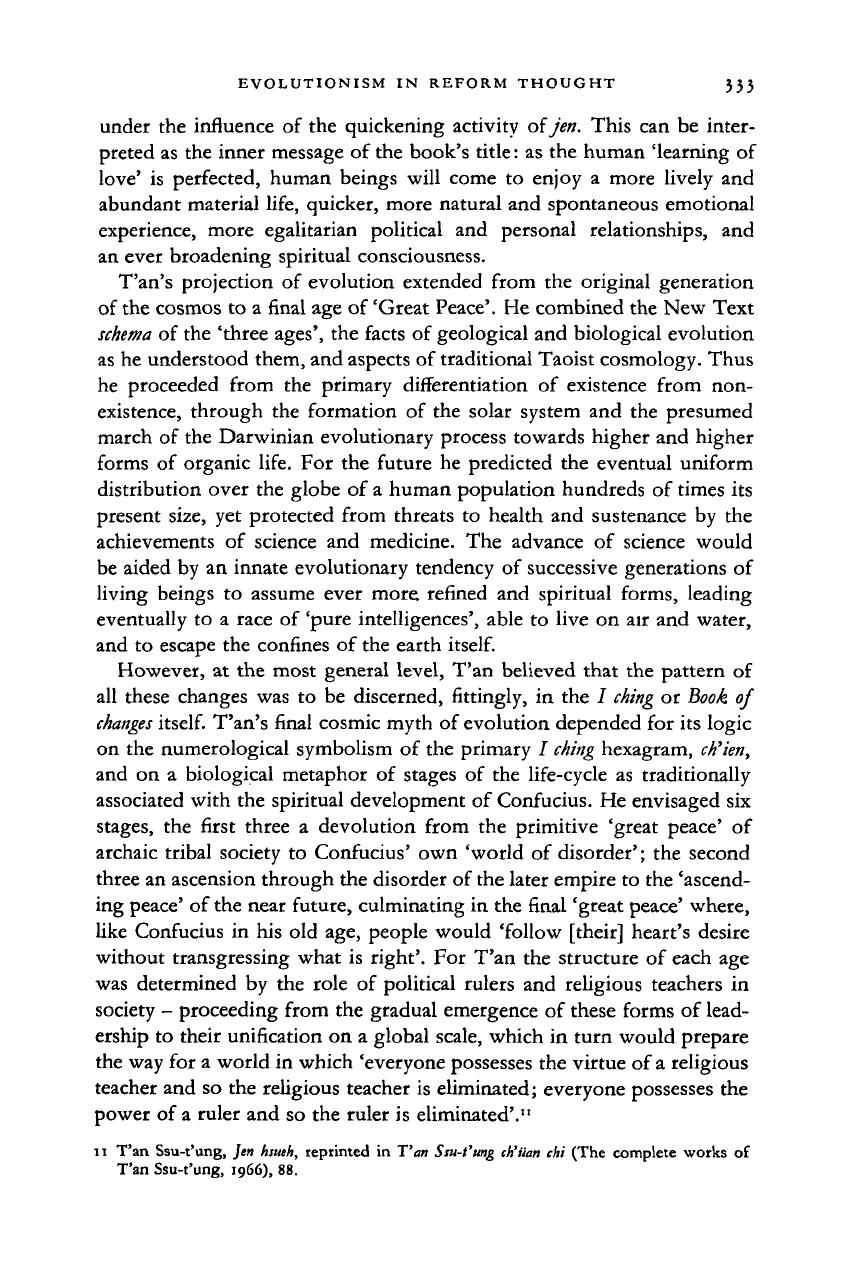
EVOLUTIONISM IN REFORM THOUGHT 333
under
the
influence
of the
quickening activity of
Jen.
This
can be
inter-
preted as
the
inner message
of
the book's title:
as the
human 'learning
of
love'
is
perfected, human beings will come
to
enjoy
a
more lively
and
abundant material life, quicker, more natural
and
spontaneous emotional
experience, more egalitarian political
and
personal relationships,
and
an ever broadening spiritual consciousness.
T'an's projection
of
evolution extended from
the
original generation
of the cosmos
to a
final
age of
'Great Peace'.
He
combined
the New
Text
schema
of
the 'three ages',
the
facts
of
geological
and
biological evolution
as
he
understood them, and aspects
of
traditional Taoist cosmology. Thus
he proceeded from
the
primary differentiation
of
existence from
non-
existence, through
the
formation
of the
solar system
and the
presumed
march
of
the Darwinian evolutionary process towards higher
and
higher
forms
of
organic life.
For the
future
he
predicted
the
eventual uniform
distribution over
the
globe
of
a human population hundreds
of
times
its
present size,
yet
protected from threats
to
health
and
sustenance
by the
achievements
of
science
and
medicine.
The
advance
of
science would
be aided
by an
innate evolutionary tendency
of
successive generations
of
living beings
to
assume ever more, refined
and
spiritual forms, leading
eventually
to a
race
of
'pure intelligences', able
to
live
on air and
water,
and
to
escape
the
confines
of
the earth
itself.
However,
at the
most general level,
T'an
believed that
the
pattern
of
all these changes
was to be
discerned, fittingly,
in the /
ching
or
Book
of
changes
itself.
T'an's final cosmic myth
of
evolution depended
for its
logic
on
the
numerological symbolism
of the
primary
/
ching
hexagram,
ch'ien,
and
on a
biological metaphor
of
stages
of the
life-cycle
as
traditionally
associated with
the
spiritual development
of
Confucius.
He
envisaged
six
stages,
the
first three
a
devolution from
the
primitive 'great peace'
of
archaic tribal society
to
Confucius'
own
'world
of
disorder';
the
second
three
an
ascension through
the
disorder
of
the later empire
to the
'ascend-
ing peace'
of
the near future, culminating
in the
final 'great peace' where,
like Confucius
in his old age,
people would 'follow [their] heart's desire
without transgressing what
is
right'.
For T'an the
structure
of
each
age
was determined
by the
role
of
political rulers
and
religious teachers
in
society
-
proceeding from
the
gradual emergence
of
these forms
of
lead-
ership
to
their unification
on a
global scale, which
in
turn would prepare
the way
for a
world
in
which 'everyone possesses
the
virtue
of
a
religious
teacher
and so the
religious teacher
is
eliminated; everyone possesses
the
power
of
a ruler
and so the
ruler
is
eliminated'."
11
T'an
Ssu-t'ung, Jen
hsueh,
reprinted
in Tan
Ssu-t'ung ch'iian chi
(The
complete works
of
T'an Ssu-t'ung, 1966),
88.
Cambridge Histories Online © Cambridge University Press, 2008
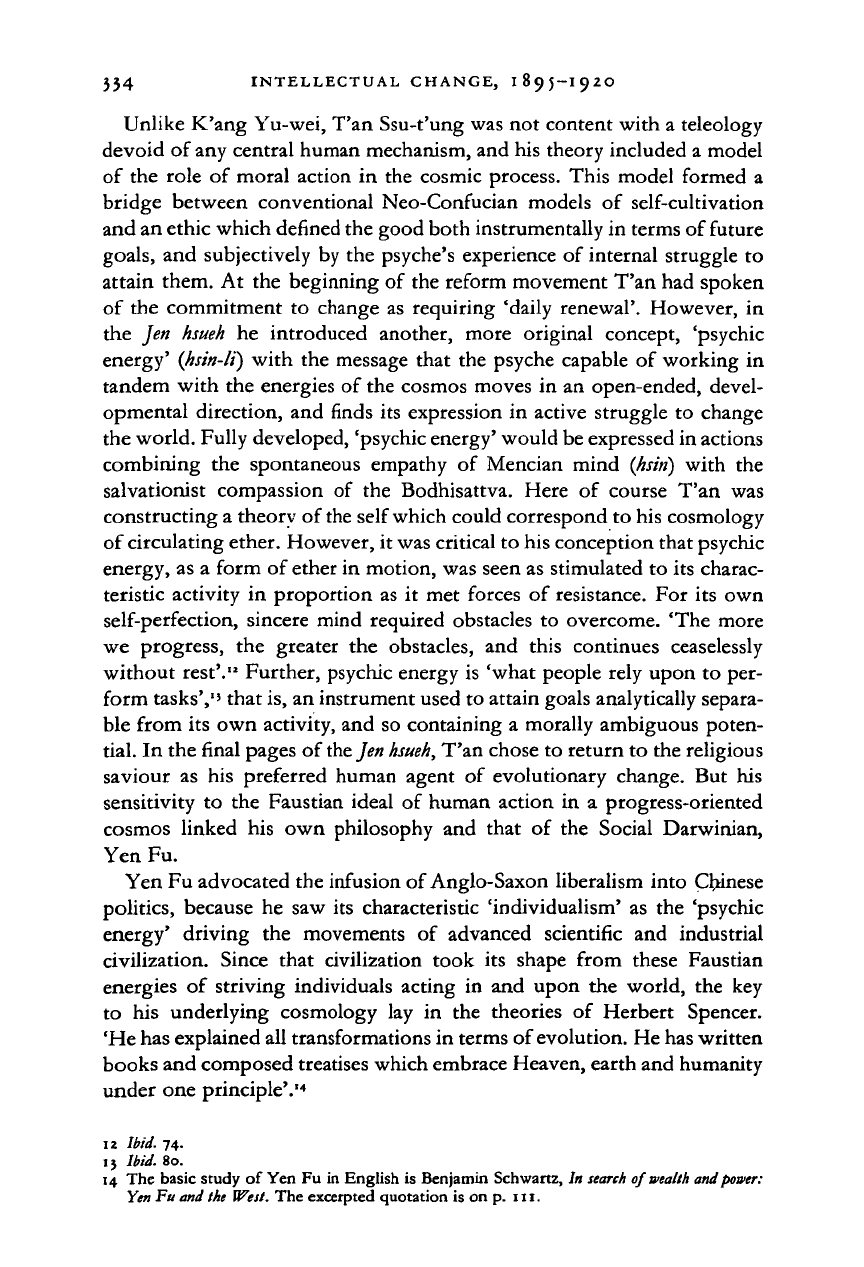
334 INTELLECTUAL CHANGE, 1895-1920
Unlike K'ang Yu-wei, T'an Ssu-t'ung was not content with a teleology
devoid of any central human mechanism, and his theory included a model
of the role of moral action in the cosmic process. This model formed a
bridge between conventional Neo-Confucian models of self-cultivation
and an ethic which defined the good both instrumentally in terms of future
goals,
and subjectively by the psyche's experience of internal struggle to
attain them. At the beginning of the reform movement T'an had spoken
of the commitment to change as requiring 'daily renewal'. However, in
the Jen hsueh he introduced another, more original concept, 'psychic
energy'
(hsin-li)
with the message that the psyche capable of working in
tandem with the energies of the cosmos moves in an open-ended, devel-
opmental direction, and finds its expression in active struggle to change
the world. Fully developed, 'psychic energy' would be expressed in actions
combining the spontaneous empathy of Mencian mind
(hsiri)
with the
Salvationist compassion of the Bodhisattva. Here of course T'an was
constructing a theory of
the
self which could correspond to his cosmology
of circulating ether. However, it was critical to his conception that psychic
energy, as a form of ether in motion, was seen as stimulated to its charac-
teristic activity in proportion as it met forces of resistance. For its own
self-perfection, sincere mind required obstacles to overcome. 'The more
we progress, the greater the obstacles, and this continues ceaselessly
without rest'." Further, psychic energy is 'what people rely upon to per-
form tasks',
1
' that is, an instrument used to attain goals analytically separa-
ble from its own activity, and so containing a morally ambiguous poten-
tial.
In the final pages of
the Jen
hsueh,
T'an chose to return to the religious
saviour as his preferred human agent of evolutionary change. But his
sensitivity to the Faustian ideal of human action in a progress-oriented
cosmos linked his own philosophy and that of the Social Darwinian,
Yen Fu.
Yen Fu advocated the infusion of Anglo-Saxon liberalism into Chinese
politics, because he saw its characteristic 'individualism' as the 'psychic
energy' driving the movements of advanced scientific and industrial
civilization. Since that civilization took its shape from these Faustian
energies of striving individuals acting in and upon the world, the key
to his underlying cosmology lay in the theories of Herbert Spencer.
'He has explained all transformations in terms of evolution. He has written
books and composed treatises which embrace Heaven, earth and humanity
under one principle'.
14
12
Ibid.
74.
13
Ibid.
80.
14 The basic study of Yen Fu in English is Benjamin Schwartz, In
search
of
wealth
and
power:
Yen
Fu and
the
West.
The excerpted quotation is on p. 111.
Cambridge Histories Online © Cambridge University Press, 2008
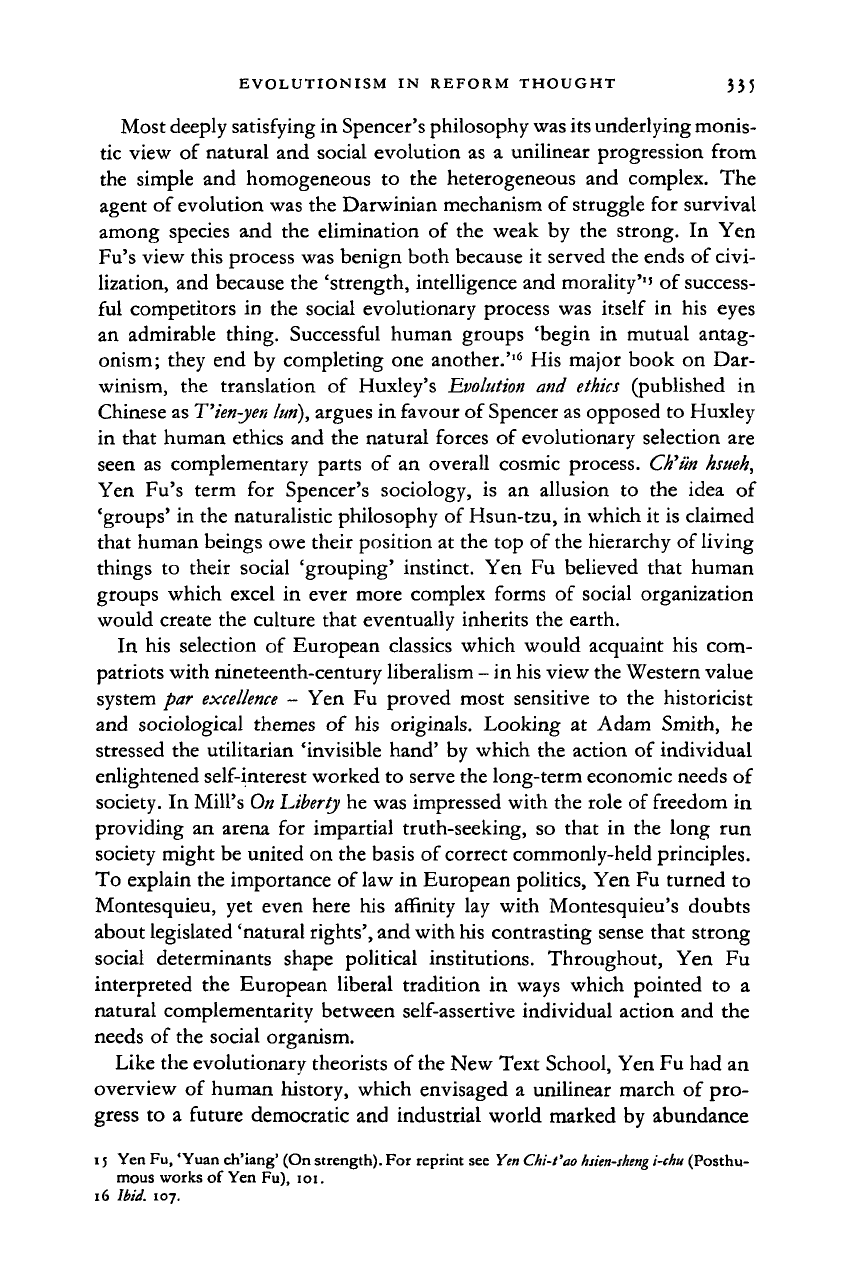
EVOLUTIONISM IN REFORM THOUGHT 335
Most deeply satisfying
in
Spencer's philosophy was its underlying monis-
tic view
of
natural
and
social evolution
as a
unilinear progression from
the simple
and
homogeneous
to the
heterogeneous
and
complex.
The
agent
of
evolution
was the
Darwinian mechanism
of
struggle
for
survival
among species
and the
elimination
of the
weak
by the
strong.
In Yen
Fu's view this process
was
benign both because
it
served
the
ends
of
civi-
lization,
and
because
the
'strength, intelligence
and
morality'
1
'
of
success-
ful competitors
in the
social evolutionary process
was
itself
in his
eyes
an admirable thing. Successful human groups 'begin
in
mutual antag-
onism; they
end by
completing
one
another.''
6
His
major book
on Dar-
winism,
the
translation
of
Huxley's Evolution
and
ethics
(published
in
Chinese as Tien-jen
Inn),
argues
in
favour
of
Spencer as opposed
to
Huxley
in that human ethics
and the
natural forces
of
evolutionary selection
are
seen
as
complementary parts
of an
overall cosmic process. Cffiin
hsueh,
Yen
Fu's
term
for
Spencer's sociology,
is an
allusion
to the
idea
of
'groups'
in
the
naturalistic philosophy
of
Hsun-tzu,
in
which
it is
claimed
that human beings
owe
their position
at
the top
of
the hierarchy
of
living
things
to
their social 'grouping' instinct.
Yen Fu
believed that human
groups which excel
in
ever more complex forms
of
social organization
would create
the
culture that eventually inherits
the
earth.
In
his
selection
of
European classics which would acquaint
his com-
patriots with nineteenth-century liberalism
-
in
his view
the
Western value
system
par
excellence
- Yen Fu
proved most sensitive
to the
historicist
and sociological themes
of his
originals. Looking
at
Adam Smith,
he
stressed
the
utilitarian 'invisible hand'
by
which
the
action
of
individual
enlightened self-interest worked
to
serve
the
long-term economic needs
of
society.
In
Mill's
On Liberty
he
was
impressed with
the
role
of
freedom
in
providing
an
arena
for
impartial truth-seeking,
so
that
in the
long
run
society might
be
united
on
the
basis
of
correct commonly-held principles.
To explain
the
importance
of
law
in
European politics,
Yen
Fu
turned
to
Montesquieu,
yet
even here
his
affinity
lay
with Montesquieu's doubts
about legislated 'natural rights',
and
with his contrasting sense that strong
social determinants shape political institutions. Throughout,
Yen Fu
interpreted
the
European liberal tradition
in
ways which pointed
to a
natural complementarity between self-assertive individual action
and the
needs
of
the
social organism.
Like
the
evolutionary theorists
of
the
New
Text School,
Yen
Fu
had
an
overview
of
human history, which envisaged
a
unilinear march
of
pro-
gress
to a
future democratic
and
industrial world marked
by
abundance
15
Yen Fu,
'Yuan ch'iang'
(On
strength).
For
reprint
see
Yen
Chi-t'ao
hsien-sheng
i-chu
(Posthu-
mous works
of Yen Fu), 101.
16 Ibid.
107.
Cambridge Histories Online © Cambridge University Press, 2008
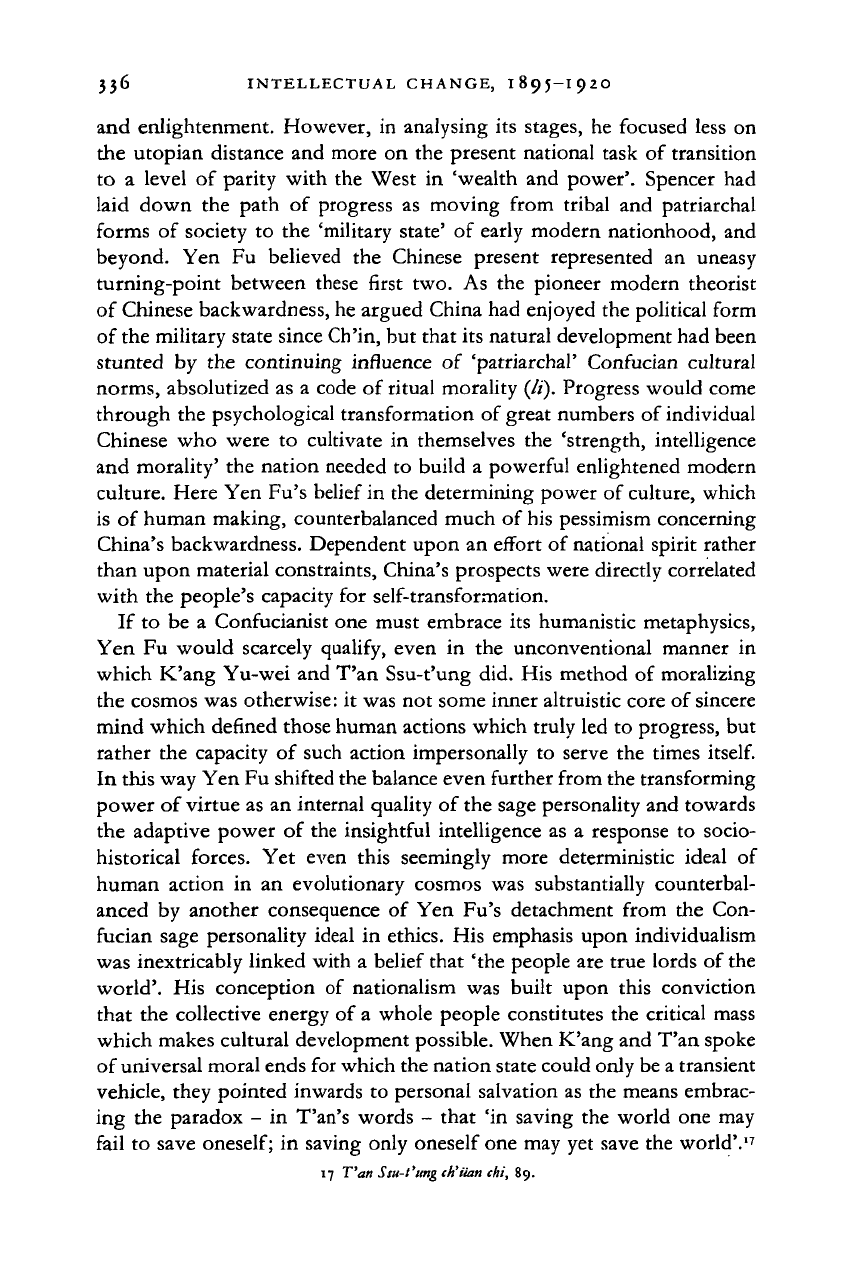
336 INTELLECTUAL CHANGE, 1895-192O
and enlightenment. However, in analysing its stages, he focused less on
the Utopian distance and more on the present national task of transition
to a level of parity with the West in 'wealth and power'. Spencer had
laid down the path of progress as moving from tribal and patriarchal
forms of society to the 'military state' of early modern nationhood, and
beyond. Yen Fu believed the Chinese present represented an uneasy
turning-point between these first two. As the pioneer modern theorist
of Chinese backwardness, he argued China had enjoyed the political form
of the military state since Ch'in, but that its natural development had been
stunted by the continuing influence of 'patriarchal' Confucian cultural
norms, absolutized as a code of ritual morality (//). Progress would come
through the psychological transformation of great numbers of individual
Chinese who were to cultivate in themselves the 'strength, intelligence
and morality' the nation needed to build a powerful enlightened modern
culture. Here Yen Fu's belief in the determining power of culture, which
is of human making, counterbalanced much of his pessimism concerning
China's backwardness. Dependent upon an effort of national spirit rather
than upon material constraints, China's prospects were directly correlated
with the people's capacity for self-transformation.
If to be a Confucianist one must embrace its humanistic metaphysics,
Yen Fu would scarcely qualify, even in the unconventional manner in
which K'ang Yu-wei and T'an Ssu-t'ung did. His method of moralizing
the cosmos was otherwise: it was not some inner altruistic core of sincere
mind which defined those human actions which truly led to progress, but
rather the capacity of such action impersonally to serve the times
itself.
In this way Yen Fu shifted the balance even further from the transforming
power of virtue as an internal quality of the sage personality and towards
the adaptive power of the insightful intelligence as a response to socio-
historical forces. Yet even this seemingly more deterministic ideal of
human action in an evolutionary cosmos was substantially counterbal-
anced by another consequence of Yen Fu's detachment from the Con-
fucian sage personality ideal in ethics. His emphasis upon individualism
was inextricably linked with a belief that 'the people are true lords of the
world'. His conception of nationalism was built upon this conviction
that the collective energy of a whole people constitutes the critical mass
which makes cultural development possible. When K'ang and T'an spoke
of universal moral ends for which the nation state could only be a transient
vehicle, they pointed inwards to personal salvation as the means embrac-
ing the paradox - in T'an's words - that 'in saving the world one may
fail to save
oneself;
in saving only oneself one may yet save the world'.
17
17 T'an Stu-t'tmg
ch'iian
chi, 89.
Cambridge Histories Online © Cambridge University Press, 2008
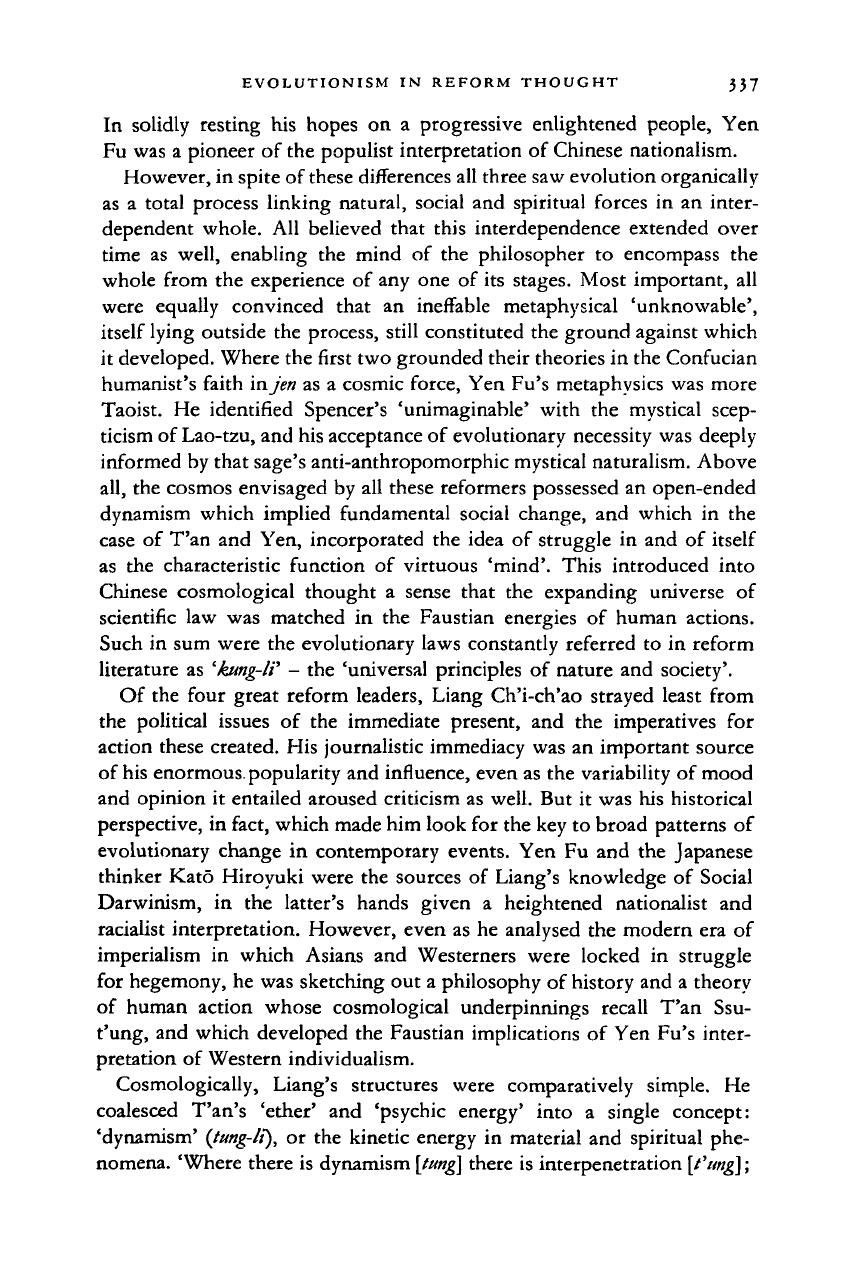
EVOLUTIONISM IN REFORM THOUGHT 337
In solidly resting his hopes on a progressive enlightened people, Yen
Fu was a pioneer of the populist interpretation of Chinese nationalism.
However, in spite of these differences all three saw evolution organically
as a total process linking natural, social and spiritual forces in an inter-
dependent whole. All believed that this interdependence extended over
time as well, enabling the mind of the philosopher to encompass the
whole from the experience of any one of its stages. Most important, all
were equally convinced that an ineffable metaphysical 'unknowable',
itself lying outside the process, still constituted the ground against which
it developed. Where the first two grounded their theories in the Confucian
humanist's faith injen as a cosmic force, Yen Fu's metaphysics was more
Taoist. He identified Spencer's 'unimaginable' with the mystical scep-
ticism of Lao-tzu, and his acceptance of evolutionary necessity was deeply
informed by that sage's anti-anthropomorphic mystical naturalism. Above
all,
the cosmos envisaged by all these reformers possessed an open-ended
dynamism which implied fundamental social change, and which in the
case of T'an and Yen, incorporated the idea of struggle in and of itself
as the characteristic function of virtuous 'mind'. This introduced into
Chinese cosmological thought a sense that the expanding universe of
scientific law was matched in the Faustian energies of human actions.
Such in sum were the evolutionary laws constantly referred to in reform
literature as 'kung-li' - the 'universal principles of nature and society'.
Of the four great reform leaders, Liang Ch'i-ch'ao strayed least from
the political issues of the immediate present, and the imperatives for
action these created. His journalistic immediacy was an important source
of his
enormous,
popularity and influence, even as the variability of mood
and opinion it entailed aroused criticism as well. But it was his historical
perspective, in fact, which made him look for the key to broad patterns of
evolutionary change in contemporary events. Yen Fu and the Japanese
thinker Kato Hiroyuki were the sources of Liang's knowledge of Social
Darwinism, in the latter's hands given a heightened nationalist and
racialist interpretation. However, even as he analysed the modern era of
imperialism in which Asians and Westerners were locked in struggle
for hegemony, he was sketching out a philosophy of history and a theory
of human action whose cosmological underpinnings recall T'an Ssu-
t'ung, and which developed the Faustian implications of Yen Fu's inter-
pretation of Western individualism.
Cosmologically, Liang's structures were comparatively simple. He
coalesced T'an's 'ether' and 'psychic energy' into a single concept:
'dynamism'
(Jung-li),
or the kinetic energy in material and spiritual phe-
nomena. 'Where there is dynamism
[tung]
there is interpenetration
[t'ung];
Cambridge Histories Online © Cambridge University Press, 2008
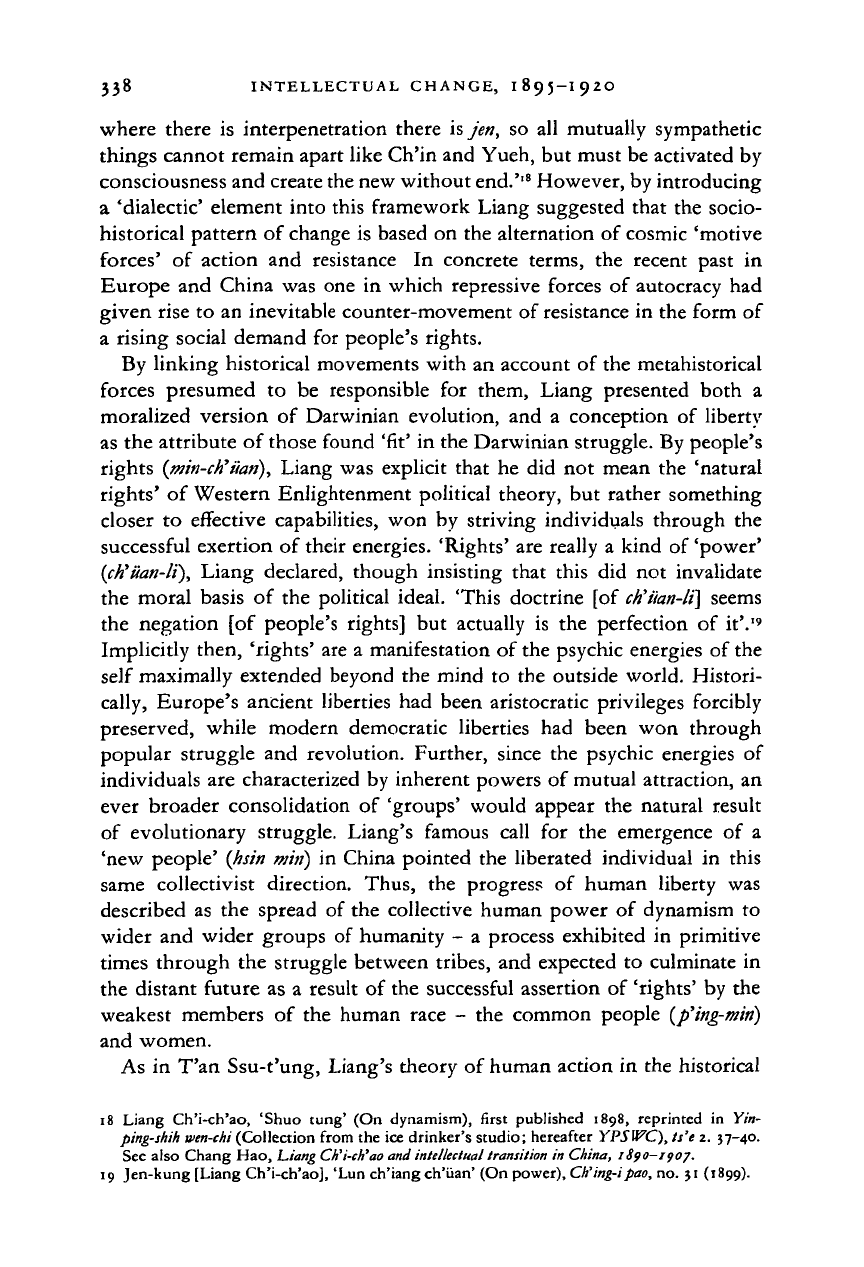
338 INTELLECTUAL CHANGE, 1895-1920
where there is interpenetration there isyV«, so all mutually sympathetic
things cannot remain apart like Ch'in and Yueh, but must be activated by
consciousness and create the new without end.'
18
However, by introducing
a 'dialectic' element into this framework Liang suggested that the socio-
historical pattern of change is based on the alternation of cosmic 'motive
forces' of action and resistance In concrete terms, the recent past in
Europe and China was one in which repressive forces of autocracy had
given rise to an inevitable counter-movement of resistance in the form of
a rising social demand for people's rights.
By linking historical movements with an account of the metahistorical
forces presumed to be responsible for them, Liang presented both a
moralized version of Darwinian evolution, and a conception of liberty
as the attribute of those found 'fit' in the Darwinian struggle. By people's
rights
{min-ch'iiari),
Liang was explicit that he did not mean the 'natural
rights'
of Western Enlightenment political theory, but rather something
closer to effective capabilities, won by striving individuals through the
successful exertion of their energies. 'Rights' are really a kind of 'power'
(ch'uan-li),
Liang declared, though insisting that this did not invalidate
the moral basis of the political ideal. 'This doctrine [of
ch'iian-lt]
seems
the negation [of people's rights] but actually is the perfection of it'.
19
Implicitly then, 'rights' are a manifestation of the psychic energies of the
self maximally extended beyond the mind to the outside world. Histori-
cally, Europe's ancient liberties had been aristocratic privileges forcibly
preserved, while modern democratic liberties had been won through
popular struggle and revolution. Further, since the psychic energies of
individuals are characterized by inherent powers of mutual attraction, an
ever broader consolidation of 'groups' would appear the natural result
of evolutionary struggle. Liang's famous call for the emergence of a
'new people'
{hsin miri)
in China pointed the liberated individual in this
same collectivist direction. Thus, the progress of human liberty was
described as the spread of the collective human power of dynamism to
wider and wider groups of humanity - a process exhibited in primitive
times through the struggle between tribes, and expected to culminate in
the distant future as a result of the successful assertion of 'rights' by the
weakest members of the human race - the common people (p'ing-min)
and women.
As in T'an Ssu-t'ung, Liang's theory of human action in the historical
18 Liang Ch'i-ch'ao, 'Shuo tung' (On dynamism), first published 1898, reprinted in Yin-
ping-shih wen-chi
(Collection from the ice drinker's studio; hereafter YPSWC), ts'e
2.
37-40.
See also Chang Hao,
Liang Ch'i-ch'ao and intellectual transition in
China,
1890-1907.
19 Jen-kung [Liang Ch'i-ch'ao], 'Lun ch'iang ch'iian' (On power),
Ch'ing-ipao,
no. }i (1899).
Cambridge Histories Online © Cambridge University Press, 2008
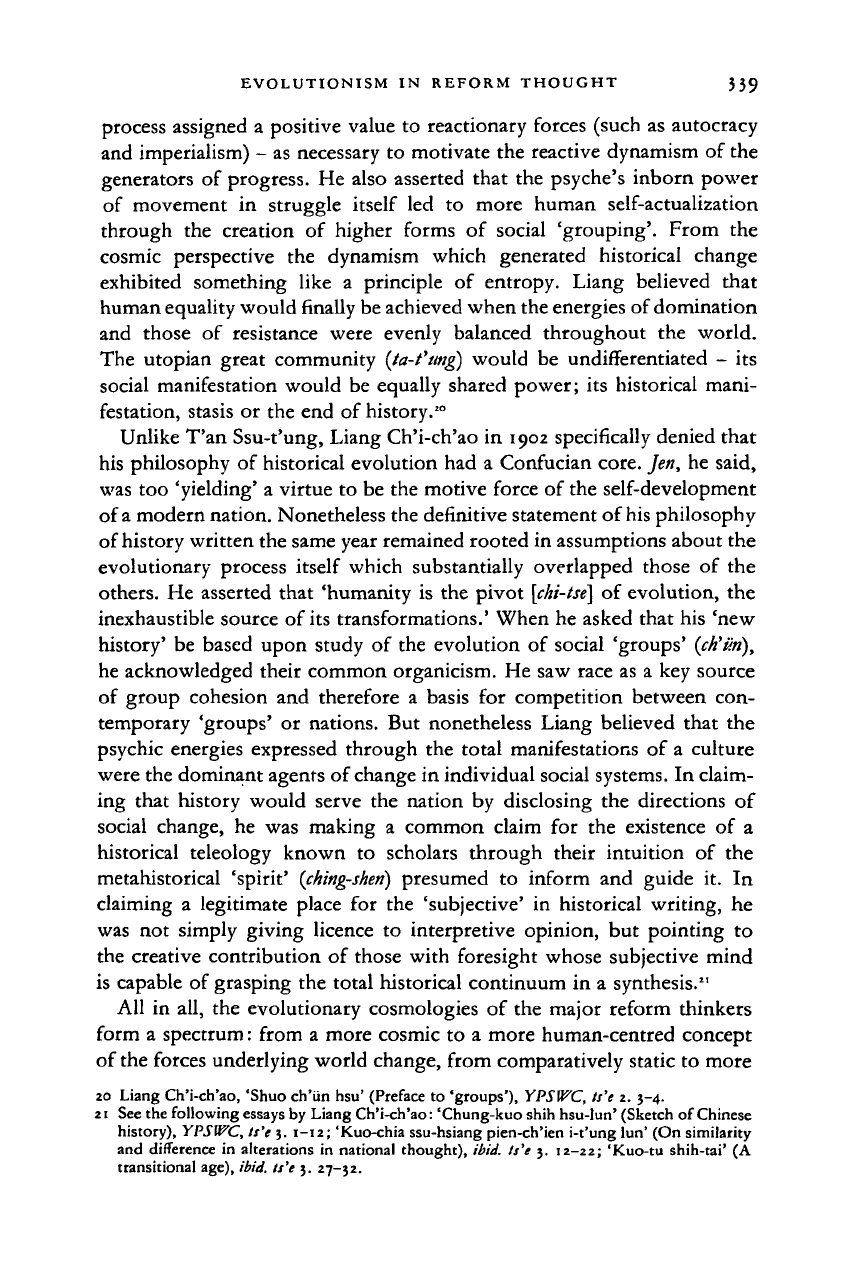
EVOLUTIONISM IN REFORM THOUGHT 339
process assigned a positive value to reactionary forces (such as autocracy
and imperialism) - as necessary to motivate the reactive dynamism of the
generators of progress. He also asserted that the psyche's inborn power
of movement in struggle itself led to more human self-actualization
through the creation of higher forms of social 'grouping'. From the
cosmic perspective the dynamism which generated historical change
exhibited something like a principle of entropy. Liang believed that
human equality would finally be achieved when the energies of domination
and those of resistance were evenly balanced throughout the world.
The Utopian great community (ta-t'ung) would be undifferentiated - its
social manifestation would be equally shared power; its historical mani-
festation, stasis or the end of history.
20
Unlike T'an Ssu-t'ung, Liang Ch'i-ch'ao in 1902 specifically denied that
his philosophy of historical evolution had a Confucian core.
Jen,
he said,
was too 'yielding' a virtue to be the motive force of the self-development
of a modern nation. Nonetheless the definitive statement of
his
philosophy
of history written the same year remained rooted in assumptions about the
evolutionary process itself which substantially overlapped those of the
others. He asserted that 'humanity is the pivot
[chi-tse]
of evolution, the
inexhaustible source of its transformations.' When he asked that his 'new
history' be based upon study of the evolution of social 'groups'
{ch'iiri),
he acknowledged their common organicism. He saw race as a key source
of group cohesion and therefore a basis for competition between con-
temporary 'groups' or nations. But nonetheless Liang believed that the
psychic energies expressed through the total manifestations of a culture
were the dominant agents of change in individual social systems. In claim-
ing that history would serve the nation by disclosing the directions of
social change, he was making a common claim for the existence of a
historical teleology known to scholars through their intuition of the
metahistorical 'spirit'
(ching-sheri)
presumed to inform and guide it. In
claiming a legitimate place for the 'subjective' in historical writing, he
was not simply giving licence to interpretive opinion, but pointing to
the creative contribution of those with foresight whose subjective mind
is capable of grasping the total historical continuum in a synthesis.
1
'
All in all, the evolutionary cosmologies of the major reform thinkers
form a spectrum: from a more cosmic to a more human-centred concept
of the forces underlying world change, from comparatively static to more
20 Liang Ch'i-ch'ao, 'Shuo ch'iin hsu' (Preface to 'groups'), YPSWC, ts'e 2. 3-4.
21 See the following essays by Liang Ch'i-ch'ao: 'Chung-kuo shih hsu-lun' (Sketch of Chinese
history), YPSWC, ts'e
3.
1-12; 'Kuo-chia ssu-hsiang pien-ch'ien i-t'ung lun' (On similarity
and difference in alterations in national thought),
ibid,
ts'e 3. 12-22; 'Kuo-tu shih-tai' (A
transitional age),
ibid,
ts'e 3. 27-32.
Cambridge Histories Online © Cambridge University Press, 2008
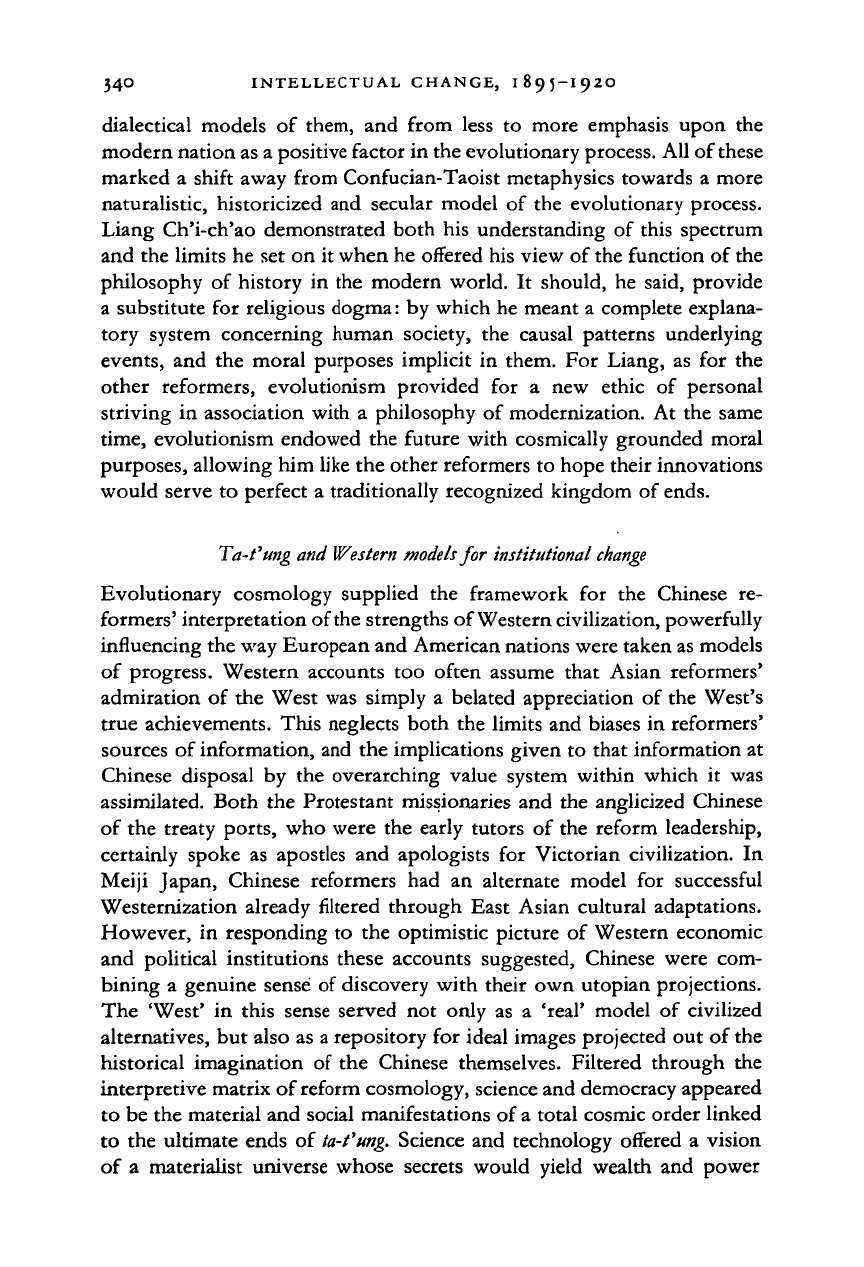
34° INTELLECTUAL CHANGE, 1895-I92O
dialectical models
of
them, and from less
to
more emphasis upon
the
modern nation as a positive factor in the evolutionary process. All of these
marked
a
shift away from Confucian-Taoist metaphysics towards
a
more
naturalistic, historicized and secular model
of
the evolutionary process.
Liang Ch'i-ch'ao demonstrated both his understanding
of
this spectrum
and the limits he set on it when he offered his view of the function of the
philosophy
of
history
in
the modern world.
It
should, he said, provide
a substitute for religious dogma: by which he meant
a
complete explana-
tory system concerning human society,
the
causal patterns underlying
events, and the moral purposes implicit
in
them. For Liang,
as for
the
other reformers, evolutionism provided
for a new
ethic
of
personal
striving in association with
a
philosophy
of
modernization. At the same
time,
evolutionism endowed the future with cosmically grounded moral
purposes, allowing him like the other reformers to hope their innovations
would serve to perfect
a
traditionally recognized kingdom of ends.
Ta-t'ung and Western models for institutional
change
Evolutionary cosmology supplied
the
framework
for the
Chinese
re-
formers' interpretation of the strengths of Western civilization, powerfully
influencing the way European and American nations were taken as models
of progress. Western accounts too often assume that Asian reformers'
admiration
of
the West was simply
a
belated appreciation
of
the West's
true achievements. This neglects both the limits and biases in reformers'
sources of information, and the implications given to that information at
Chinese disposal
by
the overarching value system within which
it
was
assimilated. Both the Protestant missionaries and the anglicized Chinese
of the treaty ports, who were the early tutors
of
the reform leadership,
certainly spoke
as
apostles and apologists
for
Victorian civilization.
In
Meiji Japan, Chinese reformers
had an
alternate model
for
successful
Westernization already filtered through East Asian cultural adaptations.
However,
in
responding to the optimistic picture
of
Western economic
and political institutions these accounts suggested, Chinese were com-
bining
a
genuine sense of discovery with their own Utopian projections.
The 'West'
in
this sense served
not
only
as a
'real' model
of
civilized
alternatives, but also as a repository for ideal images projected out of the
historical imagination
of
the Chinese themselves. Filtered through
the
interpretive matrix of reform cosmology, science and democracy appeared
to be the material and social manifestations of a total cosmic order linked
to the ultimate ends
of
ta-t'ung.
Science and technology offered
a
vision
of
a
materialist universe whose secrets would yield wealth and power
Cambridge Histories Online © Cambridge University Press, 2008
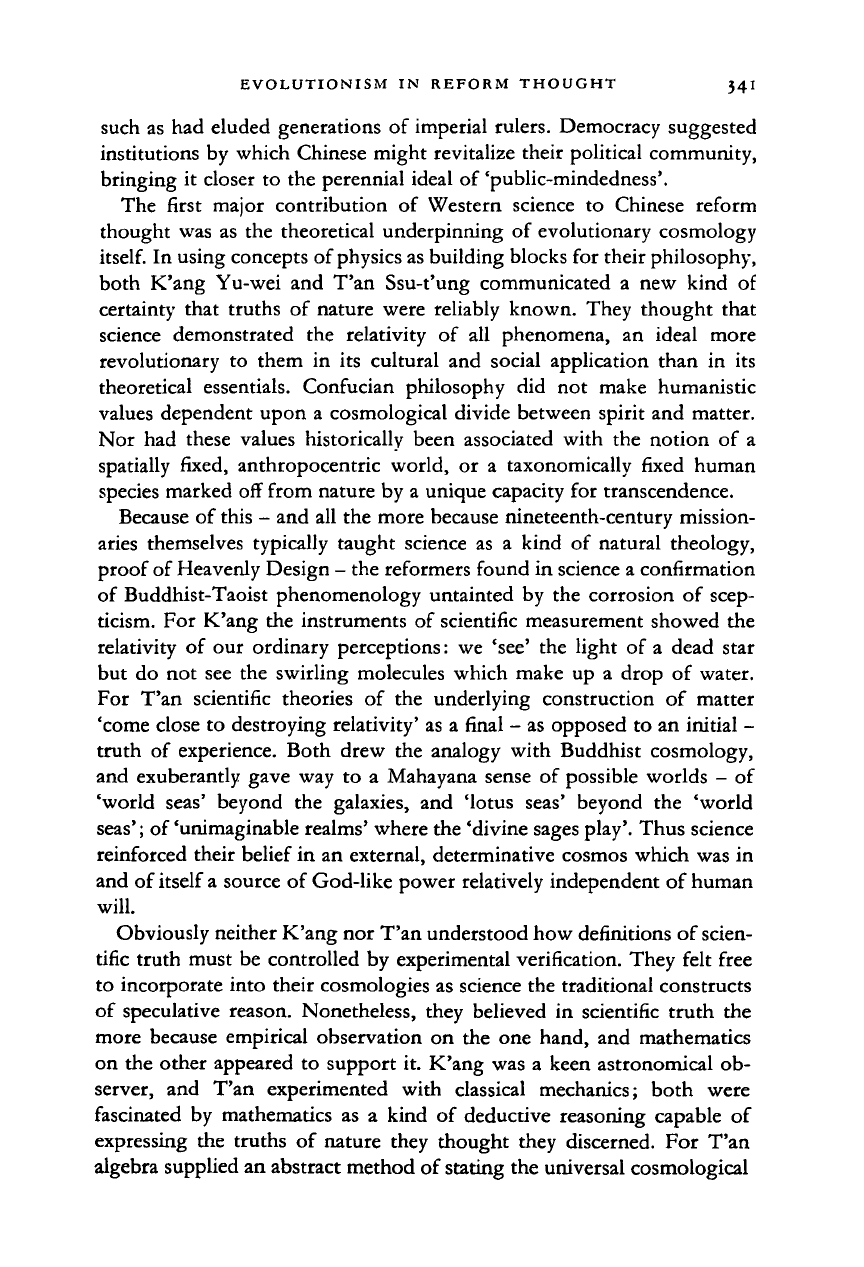
EVOLUTIONISM IN REFORM THOUGHT 341
such as had eluded generations of imperial rulers. Democracy suggested
institutions by which Chinese might revitalize their political community,
bringing it closer to the perennial ideal of 'public-mindedness'.
The first major contribution of Western science to Chinese reform
thought was as the theoretical underpinning of evolutionary cosmology
itself.
In using concepts of physics as building blocks for their philosophy,
both K'ang Yu-wei and T'an Ssu-t'ung communicated a new kind of
certainty that truths of nature were reliably known. They thought that
science demonstrated the relativity of all phenomena, an ideal more
revolutionary to them in its cultural and social application than in its
theoretical essentials. Confucian philosophy did not make humanistic
values dependent upon a cosmological divide between spirit and matter.
Nor had these values historically been associated with the notion of a
spatially fixed, anthropocentric world, or a taxonomically fixed human
species marked off from nature by a unique capacity for transcendence.
Because of this - and all the more because nineteenth-century mission-
aries themselves typically taught science as a kind of natural theology,
proof of Heavenly Design - the reformers found in science a confirmation
of Buddhist-Taoist phenomenology untainted by the corrosion of scep-
ticism. For K'ang the instruments of scientific measurement showed the
relativity of our ordinary perceptions: we 'see' the light of a dead star
but do not see the swirling molecules which make up a drop of water.
For T'an scientific theories of the underlying construction of matter
'come close to destroying relativity' as a final - as opposed to an initial -
truth of experience. Both drew the analogy with Buddhist cosmology,
and exuberantly gave way to a Mahayana sense of possible worlds - of
'world seas' beyond the galaxies, and 'lotus seas' beyond the 'world
seas';
of 'unimaginable realms' where the 'divine sages play'. Thus science
reinforced their belief in an external, determinative cosmos which was in
and of itself a source of God-like power relatively independent of human
will.
Obviously neither K'ang nor T'an understood how definitions of scien-
tific truth must be controlled by experimental verification. They felt free
to incorporate into their cosmologies as science the traditional constructs
of speculative reason. Nonetheless, they believed in scientific truth the
more because empirical observation on the one hand, and mathematics
on the other appeared to support it. K'ang was a keen astronomical ob-
server, and T'an experimented with classical mechanics; both were
fascinated by mathematics as a kind of deductive reasoning capable of
expressing the truths of nature they thought they discerned. For T'an
algebra supplied an abstract method of stating the universal cosmological
Cambridge Histories Online © Cambridge University Press, 2008
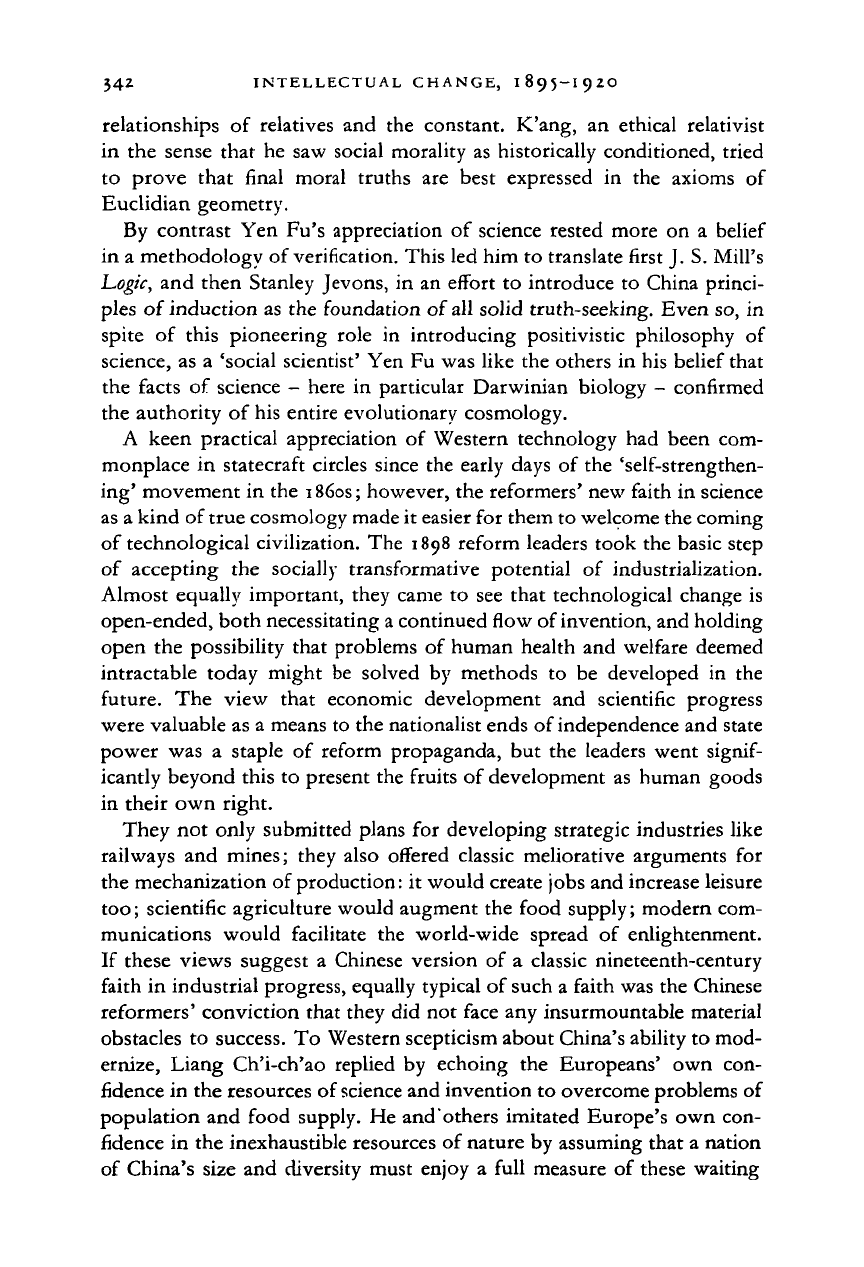
342 INTELLECTUAL CHANGE, 1895-192O
relationships of relatives and the constant. K'ang, an ethical relativist
in the sense that he saw social morality as historically conditioned, tried
to prove that final moral truths are best expressed in the axioms of
Euclidian geometry.
By contrast Yen Fu's appreciation of science rested more on a belief
in a methodology of verification. This led him to translate first J. S. Mill's
Logic, and then Stanley Jevons, in an effort to introduce to China princi-
ples of induction as the foundation of all solid truth-seeking. Even so, in
spite of this pioneering role in introducing positivistic philosophy of
science, as a 'social scientist' Yen Fu was like the others in his belief that
the facts of science - here in particular Darwinian biology - confirmed
the authority of his entire evolutionary cosmology.
A keen practical appreciation of Western technology had been com-
monplace in statecraft circles since the early days of the 'self-strengthen-
ing' movement in the 1860s; however, the reformers' new faith in science
as a kind of true cosmology made it easier for them to welcome the coming
of technological civilization. The 1898 reform leaders took the basic step
of accepting the socially transformative potential of industrialization.
Almost equally important, they came to see that technological change is
open-ended, both necessitating a continued flow of invention, and holding
open the possibility that problems of human health and welfare deemed
intractable today might be solved by methods to be developed in the
future. The view that economic development and scientific progress
were valuable as a means to the nationalist ends of independence and state
power was a staple of reform propaganda, but the leaders went
signif-
icantly beyond this to present the fruits of development as human goods
in their own right.
They not only submitted plans for developing strategic industries like
railways and mines; they also offered classic meliorative arguments for
the mechanization of production: it would create jobs and increase leisure
too;
scientific agriculture would augment the food supply; modern com-
munications would facilitate the world-wide spread of enlightenment.
If these views suggest a Chinese version of a classic nineteenth-century
faith in industrial progress, equally typical of such a faith was the Chinese
reformers' conviction that they did not face any insurmountable material
obstacles to success. To Western scepticism about China's ability to mod-
ernize, Liang Ch'i-ch'ao replied by echoing the Europeans' own con-
fidence in the resources of
science
and invention to overcome problems of
population and food supply. He and others imitated Europe's own con-
fidence in the inexhaustible resources of nature by assuming that a nation
of China's size and diversity must enjoy a full measure of these waiting
Cambridge Histories Online © Cambridge University Press, 2008
